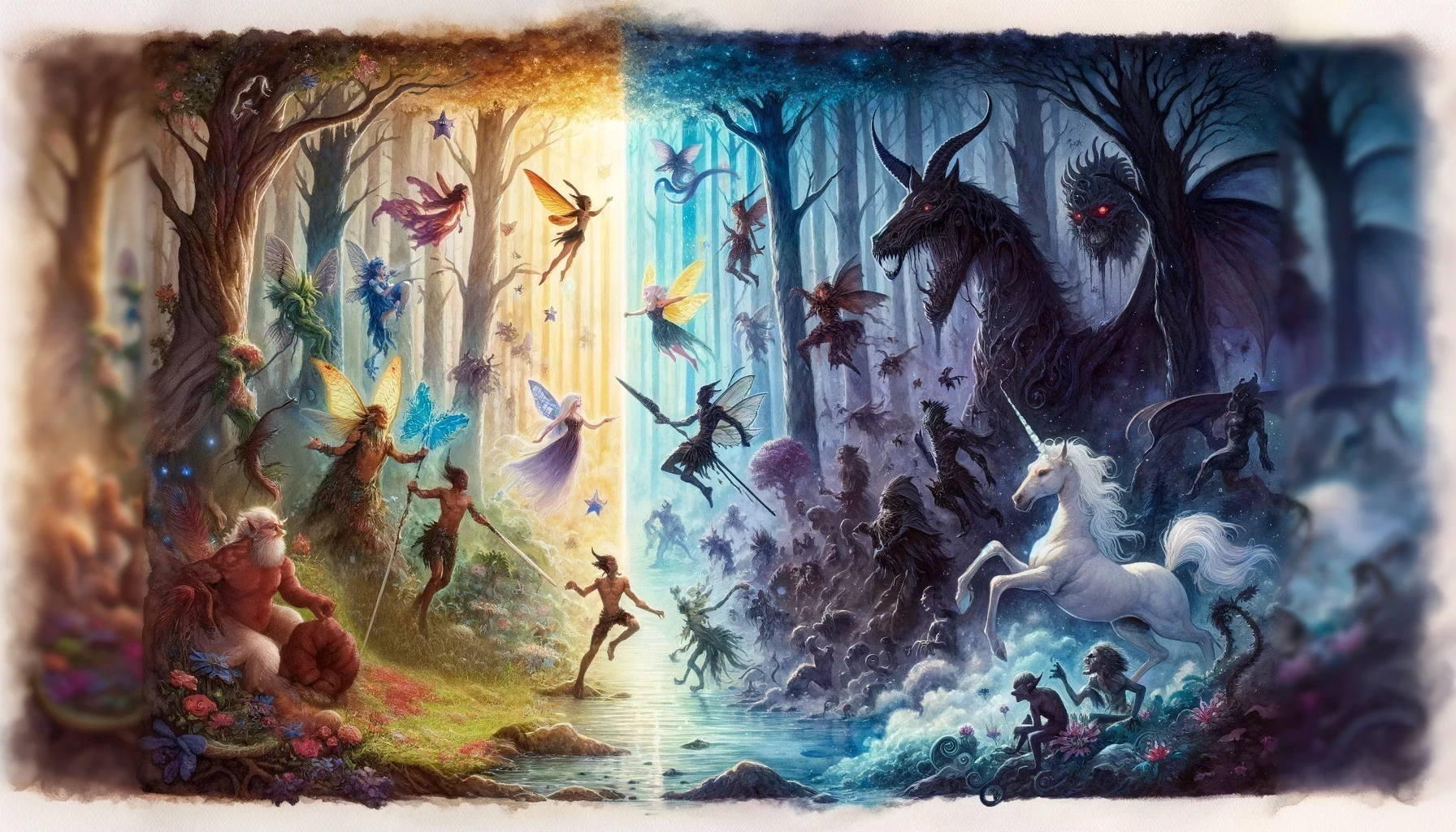top of page

The Clockwork Conspiracy
A busy steampunk cityscape scene



The Clockwork Conspiracy
A busy steampunk cityscape scene
1/4
D&D Intelligence (Int)
D&D Intelligence (Int)
Intelligence (Int):
Intelligence is one of the six primary ability scores in Dungeons & Dragons, representing a character's memory, reasoning capabilities, and analytical thinking. It is a measure of mental acuity and is used for many skill checks, particularly those involving arcane knowledge, historical facts, and problem-solving.
Key Terms Related to Intelligence
Intelligence Modifier
Derived from a character's Intelligence score, the Intelligence Modifier is a number ranging from -5 (low intelligence) to +5 (high intelligence), or potentially even higher with certain class features, races, or magic items. The modifier is added to ability checks, saving throws, and the damage rolls of certain class abilities that rely on Intelligence.
Arcana
A skill tied to the Intelligence ability. It measures a character's knowledge about magic-related lore, magical symbols, and magical constructs. Characters proficient in this skill add their proficiency bonus to Intelligence (Arcana) checks.
History
Another skill tied to Intelligence. This skill pertains to knowledge about historical events, legendary people, ancient kingdoms, past disputes, and more. Characters proficient in this skill add their proficiency bonus to Intelligence (History) checks.
Investigation
This Intelligence-based skill is used when a character attempts to deduce the meaning of clues, make deductions based on evidence, or solve a puzzle. Characters proficient in this skill add their proficiency bonus to Intelligence (Investigation) checks.
Nature
An Intelligence skill, Nature checks reflect a character's knowledge about terrain, plants, animals, the weather, and natural cycles. Characters proficient in this skill add their proficiency bonus to Intelligence (Nature) checks.
Religion
An Intelligence skill that deals with knowledge about deities, rites, prayers, religious hierarchies, holy symbols, and practices. Characters proficient in this skill add their proficiency bonus to Intelligence (Religion) checks.
Spellcasting Ability
For certain classes in D&D, such as the Wizard and the Artificer, Intelligence is their primary spellcasting ability. This means their ability to cast spells, the difficulty to resist their spells (Spell Save DC), and their spell attack modifier are all influenced by their Intelligence score and modifier.
Wizard
A character class in D&D that heavily relies on Intelligence. Wizards use Intelligence as their primary ability score for spellcasting and are known for their wide array of spells. Higher Intelligence allows a Wizard to have a higher Spell Save DC and Spell Attack bonus, and know more spells in their spellbook.
Artificer
A character class in D&D that utilizes Intelligence for their class features and spellcasting. Artificers are masters of magical invention and infuse mundane items with magic.
Intelligence Saving Throws
Certain spells and abilities require the target to make an Intelligence saving throw to resist effects that are typically mind-altering, like the spell "Feeblemind". The target rolls a d20 and adds their Intelligence modifier (and proficiency bonus if they are proficient in Intelligence saving throws), attempting to meet or exceed the spell's save DC.
Using Intelligence Attribute to plan awesome adventures
As Dungeon Masters (DMs) in Dungeons & Dragons, it is a good idea to recognize that the Intelligence attribute plays a vital role not only in character development but also in adventure design. It offers a broad range of opportunities to enrich the game's narrative, challenge the players in different ways, and create a sense of a fantasy world that is complex and immersive.
For starters, the key ability of Intelligence can be harnessed to design intricate puzzles and riddles that test the player characters' (PCs) reasoning, recall, and problem-solving skills. From cryptic writings that need translation to ancient mysteries that demand knowledge of arcane or religious lore, there are countless possibilities. Such intellectual challenges can offer a refreshing change from the usual diet of combat encounters and can engage those players who enjoy a cerebral challenge. They also help highlight the importance of high Intelligence scores in the game.
Moreover, you can use the Intelligence attribute to deepen the narrative. For instance, an NPC who's the classic absent-minded professor may provide PCs with critical information if they can help him recall it, by succeeding on Intelligence checks. Similarly, ancient ruins filled with forgotten lore can come alive through successful History or Arcana checks. Such uses of Intelligence can breathe life into the world, making it feel more real and meaningful.
Monsters from the Monster Manual with high Intelligence scores can provide cunning adversaries. A well-played mind flayer or adult white dragon can make for a far more engaging and challenging antagonist than a mere brute like a giant ape. Smart enemies use tactics, set traps, and manipulate others, demanding more from the players than just their combat prowess.
Incorporating Intelligence into skill checks for non-combat activities can also broaden the range of experiences during gameplay. For example, a Diplomacy encounter with a group of smart Forest Gnomes may require not just Charisma checks, but also Intelligence (Nature) checks to remember key cultural customs and avoid a diplomatic incident.
It's important to consider the diversity of your party's Intelligence scores when designing adventures. Not every PC will have a high Intelligence score, and that's a good thing! Part of the richness of D&D comes from the different strengths and weaknesses of the characters, and this should be reflected in the adventures you create.
Challenges should cater to a range of abilities and allow for multiple solutions. The brawny fighter might not be able to solve the wizard's riddles, but his Strength might allow him to find an entirely different solution.
In conclusion, Intelligence is more than just a stat on a character sheet; it's a tool that DMs can wield to create rich, engaging, and challenging adventures. By incorporating it into your adventure design in various ways, you ensure a well-rounded and immersive experience for all D&D players.
Ten uses of intelligence in encounters
Secret Door Discovery: A character with a high Intelligence score can use an Intelligence (Investigation) check to discern the presence of a secret door in an old, decrepit castle.
Monster Knowledge: During an encounter with a Hill Giant, a character could use an Intelligence (Nature) check to recall essential information about Hill Giants, providing them with a tactical advantage.
Puzzle Solving: A character with a high Intelligence score can apply deductive reasoning to solve a puzzle or riddle that blocks the path to a treasure in a dungeon.
Language Deciphering: A character with a high Intelligence score might know a number of languages. They could decipher ancient inscriptions or eavesdrop on unsuspecting enemies speaking in a foreign tongue.
Spell Resistance: In a confrontation with a Mind Flayer, a character might have to make an Intelligence saving throw to resist the Mind Flayer's mind-affecting abilities. A high Intelligence score could be crucial in such a situation.
Alchemy and Crafting: A character might use their Intelligence to understand and craft complex alchemical items or magical artifacts, providing useful tools for their party.
Sherlock Holmes Deduction: A character might employ their high Intelligence to piece together a crime scene in a local town, using Intelligence (Investigation) and Intelligence (Insight) checks to deduce the criminal's identity.
Arcane Knowledge: A wizard with a high Intelligence score could use an Intelligence (Arcana) check to identify a magical item's properties or to understand a magical phenomenon occurring in the world.
NPC Interaction: A scholarly NPC might challenge the players to a game of riddles or knowledge contest, where the characters must make Intelligence checks to answer correctly and gain useful information or rewards.
Religious Lore: A character might use their Intelligence (Religion) skill to decipher the religious iconography in an ancient temple, revealing the temple's purpose and the deity it serves, which could help them predict the kind of challenges or creatures they might face within.
D&D Intelligence Q&A
Q1: What does a character's Intelligence (Int) score represent in Dungeons & Dragons?
A1: A character's Intelligence score in D&D represents their mental acuity, accuracy of recall, and the ability to reason. This attribute informs the number of languages the character can speak, their ability to cast certain spells, the efficiency in performing certain skill checks, and more.
Q2: How does a high Intelligence score benefit a player character (PC)?
A2: A high Intelligence score is key for several things. It allows a character to excel in knowledge skills like Arcana, History, Investigation, Nature, and Religion. For spellcasters like Wizards, Intelligence is the ability that governs their spellcasting. Furthermore, a high Intelligence score increases the number of languages a character can be proficient in.
Q3: Can Intelligence checks and Wisdom checks be considered similar?
A3: While both Intelligence and Wisdom involve aspects of thought and perception, they are fundamentally different. Intelligence involves recall, reasoning, and knowledge, while Wisdom is more about intuition, common sense, and perceptive abilities.
Q4: How do Intelligence saves work in the game?
A4: Intelligence saves are used to resist effects that invade the mind or play with one's intellect. For example, an Illithid's Mind Blast might require an Intelligence save to resist. The higher your Intelligence score and ability modifier, the better chance you have at resisting such effects.
Q5: How does the "Keen Mind" feat relate to Intelligence?
A5: The Keen Mind feat is an excellent option for characters who want to boost their Intelligence. It increases your Intelligence score by 1 and gives you benefits relating to memory and awareness, representing a sharp and well-trained mind.
Q6: How do IQ scores relate to Intelligence scores in D&D?
A6: IQ scores and Intelligence scores don't directly correlate as they measure slightly different things and use different scales. However, both give a rough estimate of an individual's cognitive abilities. A character with a high Intelligence score in D&D would likely have a high IQ score in a real-world context.
Q7: What happens if a character has a low Intelligence score?
A7: A character with a low Intelligence score might struggle with tasks involving memory, logic, and raw knowledge. They would have lower skill checks on Intelligence-based skills, and they may know fewer languages. In role-playing terms, such a character might be more naive or have a harder time recalling facts.
Q8: Can magic items increase a character's Intelligence score?
A8: Yes, certain magic items like the Headband of Intellect or Tome of Clear Thought can increase a character's Intelligence score or set it to a certain number.
Q9: Are there any classes that particularly benefit from a high Intelligence score?
A9: Yes, Wizards, Artificers, and certain subclasses of Rogue and Fighter greatly benefit from a high Intelligence score. For Wizards and Artificers, Intelligence is their primary spellcasting ability. Some of the Rogue's and Fighter's subclass features also depend on Intelligence.
Q10: How does Intelligence factor into character creation in D&D?
A10: During character creation, Intelligence is one of the six core ability scores that players can assign points to, typically through point-buy, standard array, or dice rolls. Depending on the class and the role a player wants to play, Intelligence could be a vital attribute to invest points into.
bottom of page




